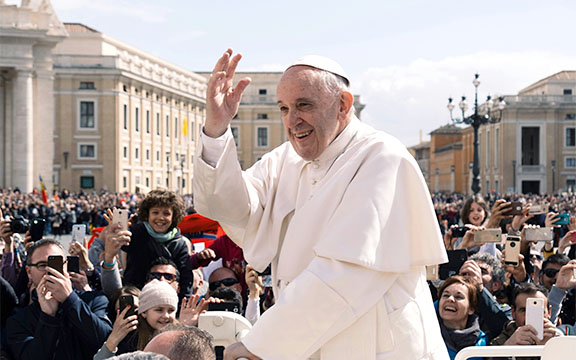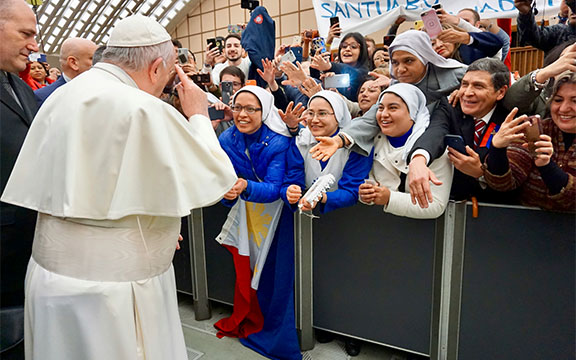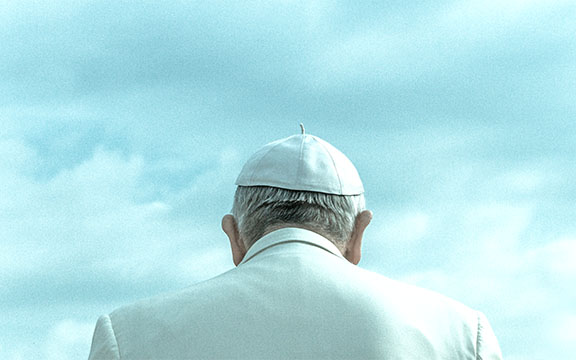
Photo by Ashwin Vaswani, courtesy of Unsplash.
Pope Francis — born Jorge Mario Bergoglio in Buenos Aires in 1936 to Italian immigrant parents — made history as the first Latin American and the first Jesuit to ascend to the papacy in the Church’s two-millennia-long tradition. Upon his election, he chose the name Francis—another first for a pope.
As we reflect on the life and legacy of Pope Francis, we are reminded of a leader who transformed the Catholic Church and touched hearts across the globe. His papacy, marked by humility, deep spirituality, and a tireless pursuit of peace, leaves an indelible mark on our world.
A Pope of the People
Pope Francis’s papacy was characterized by his unwavering commitment to being accessible and relatable to all people. He consistently emphasized the importance of a Church that “goes out,” one that is in touch with the people and their needs. His leadership style, characterized by humility and service, set a new standard for religious leaders worldwide.
Throughout his papacy, Francis demonstrated a profound understanding of the challenges faced by ordinary people. He often spoke about the need to address poverty, inequality, and social injustice. His visible support for refugees and migrants demonstrated his commitment to the marginalized, embodying the compassion at the heart of Christian teaching.
A Beacon of Peace
In a world often divided by differences, Pope Francis stood as a beacon of peace and unity. He urged Christians to be “witnesses of unity amid ongoing wars,” emphasizing the need for reconciliation. His call for a “culture of encounter” challenged the modern “throwaway culture,” affirming human dignity and promoting the global common good.
Pope Francis’s efforts to bridge divides extended to historical rifts within Christianity and beyond. His meeting with the Russian Orthodox patriarch was the first such encounter for a pope since the 11th Century East-West Schism. He also made unprecedented outreach to other faiths, consistently emphasizing the shared humanity that unites us.
A Man of Deep Spirituality
Pope Francis’s papacy was deeply rooted in his profound spirituality, shaped by his Jesuit background and the Spiritual Exercises of St. Ignatius of Loyola. He often spoke about the importance of finding God in all things, a key aspect of Ignatian spirituality. In his teachings, Francis emphasized the need for a personal relationship with God, encouraging believers to engage in heartfelt dialogue with the Divine. He stressed the importance of prayer, describing it as “always a prayer full of memory, of recollection, even the memory of my own history or what the Lord has done in his church.”
The Holy Father’s spirituality was not confined to personal piety but extended to a holistic view of human existence. He spoke about the interconnectedness of spirit, soul, and body, emphasizing that these are “profoundly and inseparably interrelated.”
A Voice for Environmental Stewardship
Environmental stewardship was another cornerstone of his papacy. Pope Francis emphasized the interconnectedness of all creation, stating, “Every act of cruelty towards any creature is contrary to human dignity.”. His encyclical “Laudato Si'” brought the urgency of environmental protection to the forefront of Catholic social teaching.
Words of Wisdom and Hope
Pope Francis’s teachings were often distilled into powerful, memorable phrases that resonated with people of all backgrounds. He reminded us that “There is never a reason to lose hope. Jesus says: ‘I am with you until the end of the world.'” His call for a “revolution of tenderness” inspired millions to embrace mercy as a fundamental aspect of faith and human interaction.
In moments of doubt or struggle, he encouraged believers with words of comfort: “Your sins are great? Just tell the Lord: Forgive me, help me to get up again, change my heart!”. This message of divine mercy and personal transformation was a hallmark of his papacy.
A Legacy of Love and Service
As we bid farewell to Pope Francis, we are reminded of his own words: “We must restore hope to young people, help the old, be open to the future, spread love. Be poor among the poor.” His legacy is not just one of diplomatic achievements, but of a lived example of love in action.
Pope Francis showed us that true leadership is rooted in service. He washed the feet of prisoners, embraced the disfigured, and consistently chose simplicity over pomp. His actions spoke as loudly as his words, demonstrating that love is indeed “the only path to Christian unity.”

Photo by Barbara Provenzano, courtesy of Unsplash.
A Continuing Inspiration
As we move forward, Pope Francis’s teachings continue to challenge and inspire us. He reminded us that prayer is “the primary responsibility in our journey together” and that unity is a “sacred responsibility.” His call to “get up and go” in the name of Christ remains a powerful exhortation to active faith.
Pope Francis’s life and teachings serve as a guiding light for all who seek to build a more compassionate, peaceful, and united world. His legacy challenges us to look beyond our differences, to serve the marginalized, to care for our common home, and to always choose love. As we reflect on his life, let us carry forward his vision of a world where mercy, dialogue, and unity prevail. In doing so, we honor not just the memory of a great spiritual leader, but the timeless values he championed throughout his life.
Integral Yoga founder Swami Satchidananda was a pioneer of the interfaith movement and would have greatly appreciated and celebrated Pope Francis’s interfaith advocacy during his papacy. The Pope’s interfaith relations through his approach to dialogue, emphasized mutual understanding, respect, and collaboration across religious divides. His efforts led to several key developments:
Building Bridges of Understanding
Pope Francis consistently called for creating “bridges of the heart” to unite people rather than merely tolerating differences. His approach went beyond superficial engagement, advocating for deeper interactions marked by respect, mutual understanding, and a shared commitment to the common good.
Promoting Dialogue with Islam
The Holy Father made particular efforts to improve Christian-Muslim relations:
- He visited the Arabian Peninsula in 2019, marking the first papal visit to Islam’s birthplace.
- In Indonesia in 2024, he signed the “Joint Declaration of Istiqlal 2024” with the grand imam of Istiqlal Mosque, furthering his dialogue with prominent Muslim leaders.
- His focus on Christian-Muslim dialogue was especially relevant in countries with large Muslim populations, like Indonesia.
Interfaith Initiatives and Symbolism
The Pope initiated and participated in various interfaith events:
- He brought leaders from Jewish, Muslim, Evangelical, and Orthodox Christian faiths together to pray for peace in the Middle East.
- In 2014, he toured the Middle East to boost ties with Muslims and Jews.
- His visits often included interfaith conferences and meetings with religious leaders from various traditions.
Pope Francis implemented several specific initiatives to promote interfaith dialogue:
Interfaith Meetings and Events
- In 2019, he signed the “Document for Human Fraternity for World Peace and Living Together” with the Grand Imam of Al-Azhar in Abu Dhabi.
- He brought leaders from Jewish, Muslim, Evangelical, and Orthodox Christian faiths together to pray for peace in the Middle East.
- In 2014, he toured the Middle East to boost ties with Muslims and Jews.
- More recently, he hosted an interfaith dialogue at the Vatican with Hebrew University students through the “Middle Meets” initiative, which was formed after the October 7th attacks.
Papal Journeys
- In 2022, he participated in the Seventh Congress of Leaders of World and Traditional Religions in Kazakhstan.
- He made the first papal visit to the Arabian Peninsula in 2019.
Institutional Initiatives
- He welcomed the formation of an international committee by Abu Dhabi to implement the “Document for Human Fraternity”.
- He supported the collaboration between the Vatican Dicastery for Interreligious Dialogue and the Congress of Leaders of World and Traditional Religions.
- He endorsed the “Middle Meets” initiative, which facilitates proactive, student-led dialogues between Jewish and Palestinian university students.
Symbolic Gestures
- Pope Francis consistently emphasized the importance of “building bridges” and establishing “true links of friendship between all people.”
- He promoted interfaith ceremonies at the Buenos Aires Metropolitan Cathedral.
These initiatives demonstrate Pope Francis’s commitment to fostering understanding, respect, and cooperation among different religious traditions.

Photo by Coronel, courtesy of Unsplash.
Emphasis on Shared Values
The Holy Father consistently highlighted common ground between religions:
- He emphasized shared values like compassion and care for the poor, bridging Christian and Islamic understandings.
- His messages often focused on universal themes of peace, fraternity, and social justice.
Enduring Legacy
Pope Francis’s approach to interfaith dialogue, characterized by openness, respect, and a focus on shared humanity, has positively impacted relations with other religions. His efforts created new opportunities for understanding and collaboration across religious divides.
In a world often divided by fear and indifference, Pope Francis has been a beacon of compassion, humility, and courage. His papacy has reminded us that true leadership is found not in power, but in service; not in judgment, but in mercy. As we honor his life and legacy, may we carry forward his call to care for the poor, protect our planet, and walk together in love—building a world where every soul is seen, and every life is sacred.

